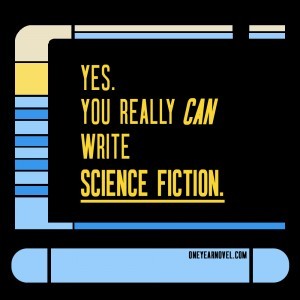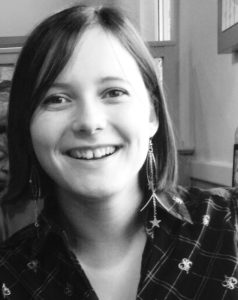Yes, You Really CAN Write Science Fiction
Guest post by Meriah Bradley
In November, Meriah Bradley discussed Writing Science Fiction When You’re Not into Science. Today, she shares 6 more steps we can take to overcome intimidation.
Step 5: Connect with other science fiction writers 
If you haven’t already, join a community of (or containing) other science fiction writers. Community is a good thing for any writer. In science fiction (SF) it’s awesome for helping each other generate unique ideas, manage technobabble, and avoid obvious scientific blunders.
I approach other SF writers for feedback on my ideas after I have some concepts and outlines in progress. Follow these steps in the order that works best for you—don’t let my system limit you.
Step 6: Don’t assume you know
Babylon 5, Star Wars, Doctor Who, etc., get lots of things wrong. There’s no sound in space. Laser guns will never be that small. Lightsabers wouldn’t work (at least as lasers). Warp speed can’t get you back home before supper—you would still be young but everyone at home would be old by the time you returned.
If you’re going with soft SF these things can be okay, but don’t assume SF writers before you just “got it right.” (During the first draft stage don’t worry too much, though; problems like these are fixable).
Step 7: It’s okay to have a logic gap
There’s always that moment when you discover the gap between where things are and where you want them to be for your book. Unless you’re writing very hard SF this is the part where the “fiction” comes in.
The smaller the logic gap is the harder your science will seem. Try to figure out the current barriers to your technology and be creative in bridging to unreality. The main thing to keep in mind is to make sure you stick with your system. Your story’s internal logic is even more important than research. If it’s not true to life, it should at least stay true to your story.
Step 8: Make friends with experts (but take their feedback with a grain of salt)
You know more of them than you think. Ask your friends if they have anyone in the family with “such and such a degree” and ask if you can have their contact information. If all else fails there are several “ask an astronaut” forums, etc., on NASA’s main site and online Q&A sessions with doctors and scientists (seek and ye will find, the Internet is a wondrous place).
When you ask questions, keep them simple and specific. These people are busy with stressful careers. Do not ask them to brainstorm with you and don’t expect them to be creative with you. Some scientists can’t enjoy SF—just as some lawyers can’t enjoy a law show—while others grew up on Star Trek. Figure out which type you have stumbled upon.
A note of encouragement: Some physicists, engineers, etc., will love the fact that you are trying for any level of accuracy and will jump at the chance to help you create a story they too can enjoy.
Now, lucky for me, I’m related to some people with handy degrees. So I didn’t have to go find them to get feedback. I also knew their limitations. In receiving feedback from any expert, remember who knows your story best. You. You know what your story needs; they know what the science of your story needs to actually work.
This is the tension of writing science fiction.
Do I change the story to fit the science or change the science to fit the story? Be confident in your understanding of what the story needs, or how solid you want the science to be. If the science makes writing your story not fun, stop worrying about it!
Step 9: Just design/write
If you’re crafty or into design, a great help to a story’s internal logic is the simple question “does it look like it will work?” When you design your own robot, speeder, disrupter rifle, etc., try drawing it or making a model. This will greatly help with many basic design flaws you might miss if it only existed in your head.
Feel free to fill a notebook with sketches or your room with cardboard models of anything essential to the story. Have some fun here, but try not to go overboard. (Remember your primary focus! And no, it wasn’t building a life-sized star fighter). Then just write. Editing will be your best friend, so make sure your “premise concepts” work and do the rest later.
You’ve done a lot of prep work. Have fun. I design while I outline, and then I write.
Step 10: Editing and feedback
Track down those experts again, if you can. Those things you only researched lightly could be inaccurate and fixable, and no one can see it better than they can (although, remember, grain of salt). Again, keep in mind they’re busy, so count yourself lucky if they actually read the excerpt or chapter you send.
Pick the section that explains one or more of your premise concepts or contains the facts you are least sure about. If your core ideas are researched then there will only be little things to fix.
Secondly, connect with those fellow science fiction writers. They too have learned things from their research and their own experts. They may notice the same mistakes in your writing they had in their own earlier projects or drafts.
If you can, do both of these things. It’s really helpful!
Part of the reason it is okay to relax during the writing process is because you don’t have to be the only one to catch the mistakes—and that goes for any element of storytelling. It also gives you the freedom to not know everything (phew!).
Summary
In the end, write what you love. Do you love spaceships in close combat fighting flashy, noisy battles? Go for it. The world needs more good Space Opera. Have you discovered that you adore researching and want to apply that knowledge to a story in a way that could actually happen? Then be brave and try out Hard SF. At the end of the day what matters more than anything is how well the story itself is written, how compelling the characters are, and if their story is worth telling.
…
What do you find helpful for writing science fiction? Add your tips in the comments.
…
Meriah is a long-time OYANer who’s passionate about bringing Christianity to science fiction. She enjoys astronomy, drawing, chocolate, music and many fandoms.
Currently she teaches English as a Second Language online to students in Korea and is in her senior year studying for a Bachelor’s in English. She lives with her husband in a little apartment not too far from her horse and a small lake, where she and her husband spar with longswords.




Man, that was a really good post!! Very helpful. 😀
Thank you for you insights in the SF field! All you tips were helpful!